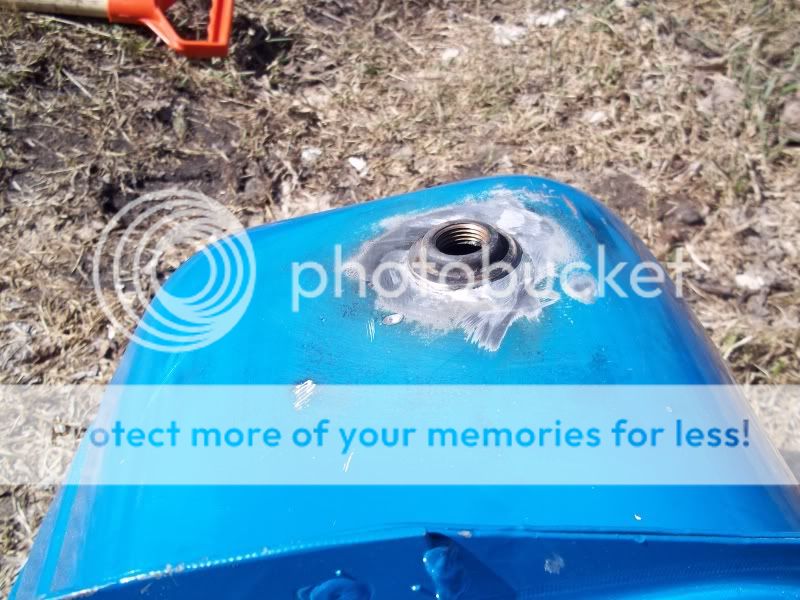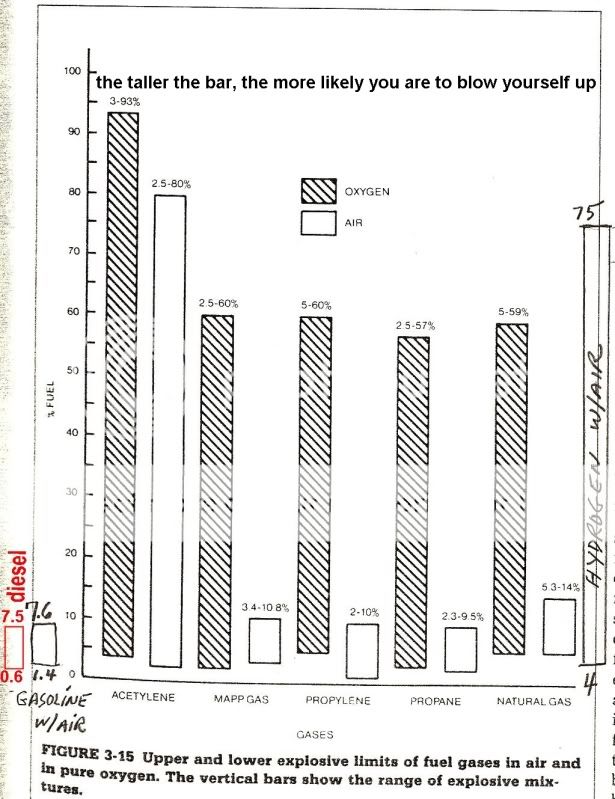Ultradog MN
Well-known Member
- Location
- Twin Cities
Jerry "You sure it wont blow up?"
Kenny, "Naw. I soldered up a lot of diesel tanks in my day and never had a problem."
Jerry " Well I'm a little skeert"
Kenny " "Naw, it's ok"
Jerry " How come you're standing so far away?"
Kenny "Well, I didn't want to be in your way. Wink, wink."
Jerry "I could fill the tank almost full of water and solder it that way"
Kenny "Naw it wont blow up."
Jerry "Well ok, here goes."
So I had the oxy/acetylene squeezed down real low so I wouldn't have too hot of a flame. Had to melt the old solder off so we could clean it up and resolder the brass bung to the tank. Old solder had cracked and was leaking.
I got the area hot and just had the solder to melt and was sliding the bung off the tank when KaWhooosh!!
Blue smoke blew out of the fill neck and the hole for the fuel guage and left a big plume in the shop.
Ken's wife Carol (who was down at the shop painting some picture frames) "AAAUUUUGGGHH"
Kenny "Chuckle, chuckle, snicker, snicker."
Jerry " What the...! I thought you said it wouldn't blow up!"
Kenny "Chuckle chuckle snicker, snicker"
Carol "Aaaauuuggghh!"
Jerry "You said it wouldn't blow up."
Kenny "It didn't blow up. snicker, snicker. Sometimes they will go wooof a little but that doesn't hurt anything. chuckle chuckle"
So I cleaned up the old solder area and put some flux on it and was going to solder the bung back on.
Jerry "You sure it wont blow up?"
Kenny "Naw. They never blow up. Sometimes they'll whooof a little but they never blow up. Gas tank will blow up but not a diesel."
Jerry "Well ok. Here goes."
Carol "AAuuughh."
Kenny "Chuckle, chuckle, snicker, snicker..."
So I soldered it back on and pressure tested it and no leaks.
I guess Kenny is right.
Sometimes they woof a little but they never blow up.
"Aaauuuggghh"

Kenny, "Naw. I soldered up a lot of diesel tanks in my day and never had a problem."
Jerry " Well I'm a little skeert"
Kenny " "Naw, it's ok"
Jerry " How come you're standing so far away?"
Kenny "Well, I didn't want to be in your way. Wink, wink."
Jerry "I could fill the tank almost full of water and solder it that way"
Kenny "Naw it wont blow up."
Jerry "Well ok, here goes."
So I had the oxy/acetylene squeezed down real low so I wouldn't have too hot of a flame. Had to melt the old solder off so we could clean it up and resolder the brass bung to the tank. Old solder had cracked and was leaking.
I got the area hot and just had the solder to melt and was sliding the bung off the tank when KaWhooosh!!
Blue smoke blew out of the fill neck and the hole for the fuel guage and left a big plume in the shop.
Ken's wife Carol (who was down at the shop painting some picture frames) "AAAUUUUGGGHH"
Kenny "Chuckle, chuckle, snicker, snicker."
Jerry " What the...! I thought you said it wouldn't blow up!"
Kenny "Chuckle chuckle snicker, snicker"
Carol "Aaaauuuggghh!"
Jerry "You said it wouldn't blow up."
Kenny "It didn't blow up. snicker, snicker. Sometimes they will go wooof a little but that doesn't hurt anything. chuckle chuckle"
So I cleaned up the old solder area and put some flux on it and was going to solder the bung back on.
Jerry "You sure it wont blow up?"
Kenny "Naw. They never blow up. Sometimes they'll whooof a little but they never blow up. Gas tank will blow up but not a diesel."
Jerry "Well ok. Here goes."
Carol "AAuuughh."
Kenny "Chuckle, chuckle, snicker, snicker..."
So I soldered it back on and pressure tested it and no leaks.
I guess Kenny is right.
Sometimes they woof a little but they never blow up.
"Aaauuuggghh"



